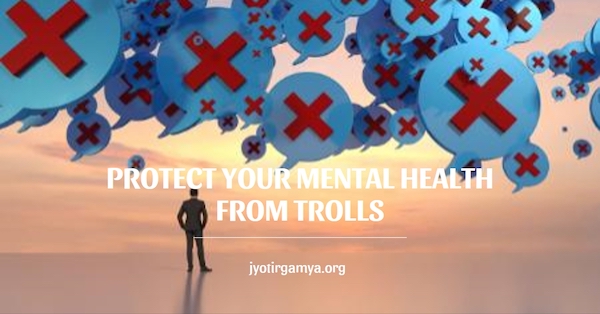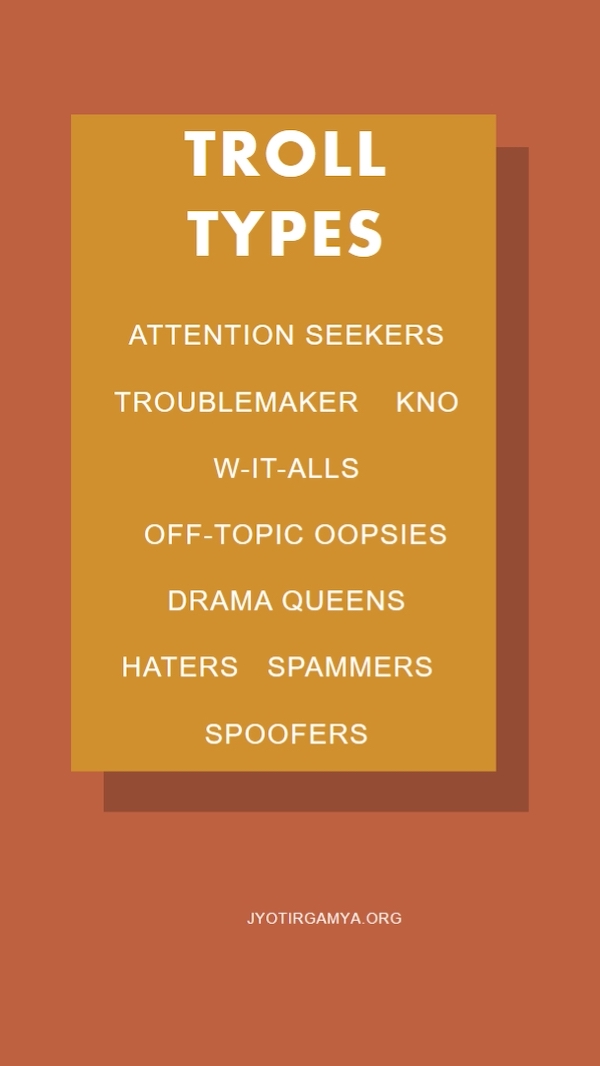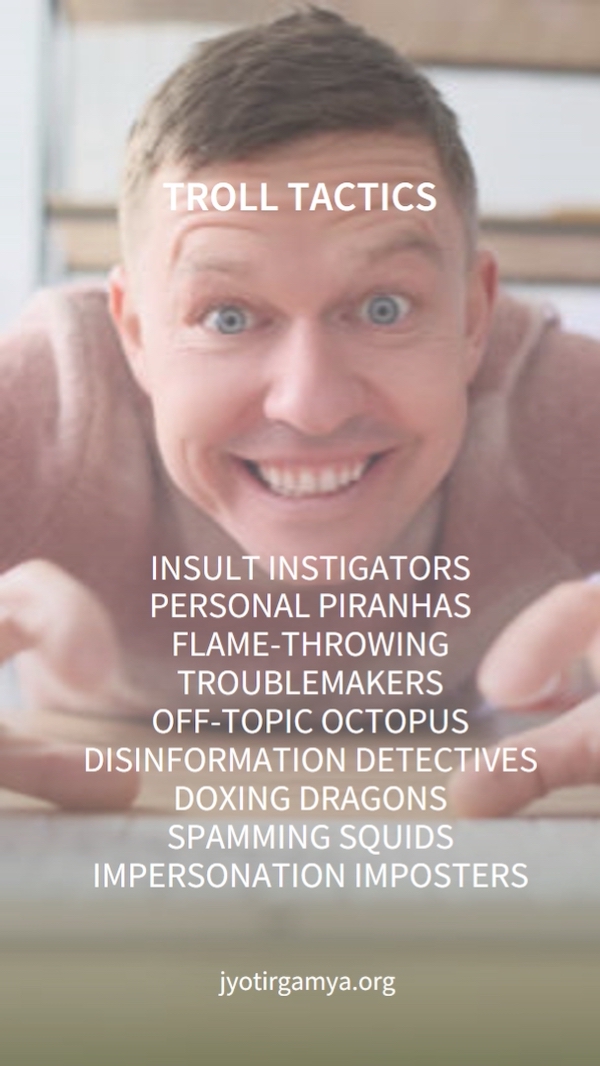Protecting Your Mental Health from Trolls
Have you ever been targeted by nasty comments or hurtful messages? You’re not alone. Trolling - those rude, attention-seeking folks leaving mean comments - can seriously mess with your mood and mental health.
This guide is like your online armor! We’ll explore the world of trolls, understand their tactics, and, most importantly, equip you with practical steps to protect your well-being in the digital world. ️ So, let’s dive in!

What exactly is trolling, and how does it hurt?
Imagine someone throwing virtual rocks at your online presence. That’s kind of what trolls do. They post insults, spread rumors, and try to stir up drama. Studies show this negativity can lead to anxiety, depression, and even worse for some folks. ⚠️
Public figures and content creators often get hit hard by trolls. Remember that singer who left social media after relentless attacks? It’s a real issue.
Trolls, trolls everywhere! But who are they?
️♀️ They’re leaving nasty comments, spreading rumors, and making the internet less happy. But why do they do it?
Think attention magnet: Some trolls crave that spotlight, even if it’s negative. They might feel unseen and use online meanness to get noticed. Think of that kid in class who always acted out – online trolls are like the digital version.
Power trip alert: Some trolls get a kick out of feeling powerful by putting others down. They might pick on people they see as weaker or different, making them feel big and bad online. It’s like a schoolyard bully but with a keyboard instead of fists.
Anonymity mask: Remember that feeling of being invisible online? Some trolls hide behind that mask to say things they wouldn’t dare say in person. They might feel encouraged by the distance the internet creates. It’s like putting on a costume that lets you act differently.
Decoding the World of Trolls: An In-Depth Analysis
Trolling behavior is pervasive on the internet, often causing harm to individuals' mental well-being. Understanding the psychology and motivations behind trolling is crucial for effectively combating its harmful effects. By delving into the depths of the troll psyche, we can develop strategies to mitigate its impact and foster healthier online communities.

Trolls come in various forms, each employing distinct tactics to elicit reactions and sow discord.
-
Attention Seekers: Like a magician desperate for applause, they crack bad jokes, post weird things, or even pick fights, just to be the center of attention. Imagine a parrot squawking for treats!
-
Troublemakers: Remember that kid who loves pushing buttons? These trolls enjoy stirring the pot, starting arguments, and making people mad. They might spread rumors, insult others, or just be generally disruptive. Think of a mischievous monkey flinging bananas!
-
Know-It-Alls: Picture a know-it-all who’s actually wrong half the time! These trolls love arguing and putting others down to feel smart, even if their “facts” are made up. Think of a parrot repeating random words it overheard!
-
Off-Topic Oopsies: Imagine showing up to a soccer game in a swimsuit. These trolls post things completely unrelated to the conversation, like mistaking a history forum for a cat picture website. Maybe they’re confused or just trying (and failing) to be funny. Like a lost puppy wandering into the wrong house!
-
Drama Queens: Remember that friend who makes every little thing a crisis? These trolls exaggerate everything, turning minor inconveniences into epic tragedies. They crave sympathy and want the world to revolve around their “problems.” Think of a goldfish pretending it’s about to dry up!
-
Haters: Imagine someone who rains on everyone’s parade. These trolls just plain dislike things and love criticizing everything, even if it’s good. They might spread negativity and bring down the mood, like a grumpy cloud stealing the sunshine.
-
Spammers: Picture a broken record player stuck on repeat. These trolls flood online spaces with the same message over and over, like ads or unrelated links. They’re more like machines than people, just trying to sell something or cause trouble.
-
Spoofers: Imagine a chameleon changing colors to blend in. These trolls pretend to be someone else (like a friend or expert) to deceive others, often to spread misinformation or cause chaos. Think of a wolf in sheep’s clothing!
Additionally, societal and cultural factors shape trolling behavior, with some communities exhibiting higher tolerance or even encouragement of such behavior (Bishop & Palfrey, 2013). Recognizing these different types of trolls and their tactics is crucial for implementing targeted interventions.
Exploring the Psychology of Trolls
Trolls thrive on attention, wielding the anonymity of the digital world to their advantage. Research suggests that individuals who engage in trolling behavior often exhibit traits such as narcissism, sadism, and Machiavellianism (Buckels et al., 2014). This need for attention and a sense of power dynamics in online interactions fuels their disruptive behavior.
Unveiling Hidden Motivations
Behind the veil of anonymity, trolls may harbor various motivations driving their actions. Envy, resentment, or a desire for chaos can fuel their online antics. Moreover, underlying psychological conditions, such as low self-esteem or social isolation, may exacerbate trolling behavior (Shachaf, 2009). Understanding these hidden motivations is essential for devising effective strategies to counteract trolling.
But wait, there’s more! Trolls come in all shapes and sizes. Some just want attention, others crave power, and some might even be dealing with deeper issues. Plus, online interactions are tricky - what seems like trolling could be a misunderstanding. So remember, context is critical!
How do Trolls Attack?
We met the different troll personalities, but how do they attack? Imagine a bully’s toolbox, only filled with digital nastiness. Here’s what’s in it:
Troll Tactics: A Field Guide for Young Web Warriors
Remember those pesky characters in video games who try to ruin your progress? Trolls online are kind of like that, but instead of fireballs, they use words and actions to disrupt and upset others. Here’s a deeper dive into their favorite “attacks”:

1. Insult Instigators: These trolls are like name-calling playground bullies, but with keyboards instead of fists. They hurl insults, make fun of people’s appearances, and try to bring others down with mean jokes and comments. Just like you wouldn’t let a bully push you around, don’t give these trolls the power to hurt your feelings. Remember, their words don’t define you!
2. Personal Piranhas: Imagine someone sharing your secrets with everyone at school. That’s what these trolls do, except online. They might spread rumors, share private information, or even make up lies to embarrass or hurt others. This is a serious attack, so if you encounter one, tell a trusted adult immediately and remember, never share personal information online with strangers.
3. Flame-Throwing Troublemakers: Picture throwing gasoline on a campfire. These trolls post inflammatory comments or opinions designed to start arguments and get people riled up. They enjoy watching the chaos unfold, but don’t get sucked into their game! Remember, the best way to deal with fire is to avoid it. Don’t engage with these trolls, just walk away and let them fizzle out on their own.
4. Off-Topic Octopus: Imagine playing tag, but someone keeps changing the rules and running off in a different direction. That’s what these trolls do online. They post irrelevant comments, change the subject completely, and derail conversations, leaving everyone confused and frustrated. The best way to handle them is to ignore their off-topic antics and keep the conversation on track.
5. Disinformation Detectives (Dishonest Kind): Remember that game where you whisper a message and it gets twisted by the time it reaches the end? These trolls are like that, but with facts. They spread false information, twist truths, and make up lies to mislead people. Be a smart web detective! Always double-check information before sharing it, and remember, if something sounds too good (or bad) to be true, it probably is.
6. Doxing Dragons: Imagine someone shouting your home address in a crowded mall. That’s how dangerous these trolls can be. They share personal information like addresses, phone numbers, or even private messages to scare or harm others. This is NEVER okay, so if you encounter one, tell an adult immediately and remember, never share personal information online with anyone you don’t know and trust in real life.
7. Spamming Squids: Imagine getting buried under a mountain of junk mail. These trolls are like that, but online. They flood websites and forums with repetitive messages, ads, or links, making it hard to find anything useful. Don’t get caught in their ink cloud! If you see spam, report it to the website moderators and move on.
8. Impersonation Imposters: Imagine someone pretending to be your best friend to borrow your lunch money. These trolls online do the same, but they pretend to be someone else (like a celebrity or expert) to deceive people and spread misinformation. Be an internet Sherlock Holmes! If something seems suspicious, double-check the account information and be cautious about trusting anyone you don’t know personally.
Fight back, but fight smart! Trolling tactics tackled!
Remember, even though trolls can be annoying, fighting fire with fire usually doesn’t help. Here are some superhero-approved strategies to deal with them instead:
1. The Invisibility Cloak: This is like Harry Potter hiding from Voldemort! Just ignore the troll. They thrive on attention, so by not giving them any, you take away their power. Imagine them throwing rotten tomatoes, but you’re wearing an invisible cloak, so they hit nothing! Don’t reply to their comments, even if they’re super mean. It’s like feeding a monster – they’ll keep returning for more. Just ignore them; they’ll get bored eventually.
2. The Block Button Shield: Feeling brave? Use the block button or reporting tools available on most platforms. This is like putting a magic shield around yourself, making the troll’s attacks bounce harmlessly away. Remember, though, use this power wisely and only for real attacks, not just someone you disagree with.
3. The Laughter Potion: Some trolls just want to see you upset. So, unleash your inner comedian! Turn their negativity into a joke (if it’s safe and kind, of course). Imagine turning their insults into silly bubbles that pop with a giggle. Remember, laughter is the best medicine!
4. The Truthful Wand: Sometimes, trolls spread misinformation. Fight back with the truth wand! Share accurate information and sources politely. Think of it like casting a spell of facts that dispels the troll’s fog of confusion.
5. The Ally Squad: You don’t have to face trolls alone! Gather your friends and allies online to support each other and report bad behavior together. Imagine forming a superhero team to stand up for kindness and respect online.
6. The Positivity Portal: Remember, trolls feed on negativity. Spread positivity instead! Share kind messages, funny memes, and uplifting content. Think of it like building a portal of happiness that drowns out the troll’s negativity with sunshine.
7. The Digital Detox: Sometimes, the best way to deal with trolls is to take a break! Log off and do something fun offline. Imagine stepping out of the online world and into a peaceful forest, leaving the trolls behind.
8. Mindfulness magic! ✨ Feeling overwhelmed by negativity? Take a deep breath! Mindfulness exercises like counting breaths or focusing on your surroundings can help you stay calm and collected, even when trolls try to stir things up. Think of it like a mental shield that deflects their nastiness.
9. Self-care superhero! Feeling stressed by online drama? It’s time for some TLC! Get moving with exercise, connect with nature, or unleash your creativity with painting, writing, or whatever makes you smile. These activities are like your secret weapons, boosting your mood and resilience against troll attacks.
10. Lawyers, assemble! In some cases, like nasty threats or harassment, you can involve the law! But talk to an adult first!
11. Expert help when needed! Sometimes, even with all these tools, trolls can be overwhelming. Talking to a professional, like a therapist or counselor, is okay if you feel down or scared. They’re likewise mentors who can help you navigate tricky situations and feel better again.
Remember, fighting back doesn’t mean stooping to the trolls' level. Be smart, be safe, and most importantly, stay strong! We’re here to support you every step of the way in creating a happier, troll-free online world. ✨
Parting Thoughts
We’ve faced the trolls, built our mental forts, and learned intelligent ways to fight back. Remember all the excellent tools we have:
- Mindfulness magic: Like a superhero shield, it deflects negativity.
- Tech tools to the rescue: Block, report, filter – zap away bad vibes!
- Self-care superhero: Exercise, nature, creativity – boost your mood like a power-up!
- Don’t feed the trolls: Starve them of attention; they’ll get bored.
- Community support: You’re not alone; fight trolls together!
- Seek help when needed: Talk to professionals if things get tough.
Remember, the internet can be a fantastic place. Using these tools and staying positive, you can navigate it with confidence and resilience.
So go forth and spread kindness online! ✨ Share this guide with others, help them build their forts, and together, we can create a happier, troll-free digital world for everyone!
Recommended Reading
The Challenge of Anger Management
How to Avoid Relationship Problems
If you like what we are doing, do spread the word.
Want to stay connected? Here’s our twitter.
Or subscribe to our monthly newsletter containing tools for body, mind, and goal.